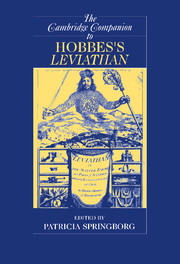Book contents
- Frontmatter
- General Introduction
- Part I: Of Man
- Part II: Of Commonwealth
- Part III: Of a Christian Commonwealth
- 10 Hobbes’s Covenant Theology and Its Political Implications
- 11 Omnipotence, Necessity and Sovereignty: Hobbes and the Absolute and Ordinary Powers of God and King
- 12 Hobbes on Salvation
- 13 Hobbes and the Cause of Religious Toleration
- Part IV: Of the Kingdom of Darkness
- Part V: Hobbes’s Reception
- Bibliography
- Index
- Series List
13 - Hobbes and the Cause of Religious Toleration
from Part III: - Of a Christian Commonwealth
Published online by Cambridge University Press: 28 November 2007
- Frontmatter
- General Introduction
- Part I: Of Man
- Part II: Of Commonwealth
- Part III: Of a Christian Commonwealth
- 10 Hobbes’s Covenant Theology and Its Political Implications
- 11 Omnipotence, Necessity and Sovereignty: Hobbes and the Absolute and Ordinary Powers of God and King
- 12 Hobbes on Salvation
- 13 Hobbes and the Cause of Religious Toleration
- Part IV: Of the Kingdom of Darkness
- Part V: Hobbes’s Reception
- Bibliography
- Index
- Series List
Summary
Many readers of Leviathan will be surprised by the suggestion that in that work Hobbes might have been - in intention and in act - a friend of religious toleration. Who could be further removed, on this issue, from that 'saint of liberalism', John Locke? Locke's Letter on Toleration sought a kind of separation of church and state, arguing that each of these institutions has its own areas of legitimate concern, that the state exists to protect our temporal interests, and is entitled to use force to do so, but that it cannot use coercion to advance our spiritual interests. These are the province of the churches, which also cannot use force to achieve their ends. Since a saving faith must be uncoerced, they must rely on persuasion. Hobbes is certainly not a saint of liberalism in that sense. He advocates, not a separation of church and state, but a subordination of the church to the state.
On Hobbes's view it is an essential prerogative of the sovereign to determine what books may be published and what doctrines may be taught, in public gatherings generally, but especially in the universities and the churches. He thinks the sovereign must not only see that doctrines harmful to peace are not taught but also ensure that doctrines promoting his absolute authority are taught.
- Type
- Chapter
- Information
- The Cambridge Companion to Hobbes's Leviathan , pp. 309 - 334Publisher: Cambridge University PressPrint publication year: 2007
- 10
- Cited by



